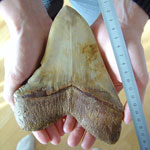National Megalodon Day Date in the current year: June 15, 2026
 National Megalodon Day is observed annually on June 15 to celebrate one of the largest predators to have ever lived whose tooth is the state fossil of North Carolina. It was created by the Aurora Fossil Museum in Aurora, North Carolina in 2021 to commemorate its opening anniversary.
National Megalodon Day is observed annually on June 15 to celebrate one of the largest predators to have ever lived whose tooth is the state fossil of North Carolina. It was created by the Aurora Fossil Museum in Aurora, North Carolina in 2021 to commemorate its opening anniversary.The megalodon is an extinct shark species that lived millions of years ago in the Miocene and Pliocene epochs. Originally thought to be closely related to the great white shark that belongs to the family Lamnidae, it is now classified into the family Otodontidae (megatoothed sharks), which has no extant members. Both families, however, still belong to the same order, Lamniformes (mackerel sharks).
The first records of gigantic triangular fossils being identified as shark teeth date back to the mid-17th century. The shark received its initial scientific name, Carcharodon megalodon, from Swiss-born American naturalist Louis Agassiz. The generic name Carcharodon means “jagged/sharp tooth”, and the specific name megalodon means “big tooth”. When megalodon was assigned to the family Otodontidae, its scientific name was changed to Otodus megalodon.
Only fragmentary remains of the megalodon have been found, most commonly teeth, but even they demonstrate that the megalodon is one of the largest predators that have ever lived. According to most estimates that extrapolate the creature’s size from its fossilized teeth, the maximum length of the megalodon was 46–67 feet (14–20.3 meters). The longest sharks weighed up to 114 short tons (103 metric tons).
The fossil record suggests that the range of the megalodon extended across most of the world (this is called a cosmopolitan distribution). This enormous shark is believed to have been an apex predator that targeted sea turtles, seals, dolphins, whales, and other large prey, using its strong jaws and thick teeth to grab prey, break through its chest cavity, and kill by puncturing the lungs and heart.
The megalodon probably went extinct gradually due to a combination of factors that affected marine life. They included the climate change, a decline in the diversity of marine ecosystems, and the emergence of other predatory species such as sperm whales, great white sharks and killer whales.
National Megalodon Day was launched by the Aurora Fossil Museum, a non-profit natural science museum and science education resource center in North Carolina. Most of its collection consists of fossils found in the nearby phosphate mine. It includes the remnants of megalodon displayed in the museum’s shark hall. The megalodon is the museum’s “flagship fossil”; its tooth is portrayed on the emblem of the Aurora Fossil Museum.
The Aurora Fossil Museum designated June 15 as National Megalodon Day in 2021 to celebrate its opening anniversary and to educate the general public about this amazing and terrifying extinct shark species. There are many ways to celebrate the holiday; for example, you can attend a fossil museum near you or donate to it, read a book or watch a documentary about the megalodon or other extinct species, or even pick up paleontology as a hobby.
- Category
- Ecological Observances
- Country
- USA
- Tags
- National Megalodon Day in the United States, international observances, environmental observances, megalodon